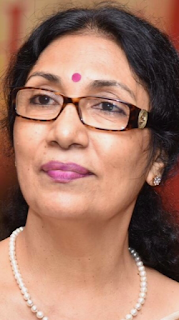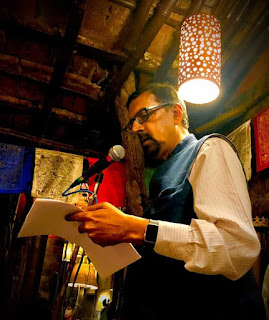Interview with Bina Pillai about her novel Under the Mango tree- Interview 7th
 Today, we have Bina Pillai, an award winning writer, who has
recently authored the immensely interesting novel Under the Mango Tree [Bigfoot Publications], with us. I have had the privilege of earlier reading
her book of poems, Lyrical Rhythms of my
Heart and enjoying it immensely. Let us hear her talk about Under the Mango Tree.
Today, we have Bina Pillai, an award winning writer, who has
recently authored the immensely interesting novel Under the Mango Tree [Bigfoot Publications], with us. I have had the privilege of earlier reading
her book of poems, Lyrical Rhythms of my
Heart and enjoying it immensely. Let us hear her talk about Under the Mango Tree.
Santosh: Bina Pillai, let me congratulate
you for your recent novel, Under the Mango Tree, the title has
a highly appealing, ring of innocence to it, and let me tell you, I really
loved the book. I would just like you to answer certain questions
regarding the book.
Bina: Thank you Santosh , I knew you would like my book Santosh
Bakaya, because I had worked very hard on my book. Under the Mango Tree. I wanted to give it my best shot. So far it
has been received very well by all the readers and I’m delighted to see 29
reviews and all 5 star ratings on Amazon.
Santosh Q 1: That is indeed commendable. I have always maintained and let me reiterate here, that hard work always pays. Bina, I would like to know, what is that streak in you which defines you? From what I could gather from your writings, it is the streak of an undying optimism and positivity. Correct me if I am wrong.
Bina: You're right on that—self -esteem and
positivity are my strength. I believe if we are positive, we can find happiness
in everything around us.
Santosh Q 2: Yes, indeed, same here. I also try to be as
optimistic and positive as possible under all circumstances, [though, believe me,
it is not easy] Bina, tell us something about your recently published book, Under
the Mango tree. [ Bigfoot, 2019] How long did it take you
to finish the book? I had read your poetry book, Lyrical Rhythms of
my heart, [Notion press, 2017] and loved it. In
fact, I noticed that the poem Reminiscences appears in your
novel too, where you talk about a mango tree of youth. Did this novel emerge
from that poem?
Bina:
Diya the Protagonist in my book Under the
Mango Tree, represents many women and some men of my era -the 70s and the
80s. We were not allowed to voice our opinion, had no freedom and were not
allowed to study. But it was also an era
where the hippie culture had come into India. Teenagers sported long hair and
being influenced by their culture started to question their parents, elders and
teachers. Yet it was a crime to fall in love, fearing which the parents got
their daughters married early.
Santosh:
The book talks about a marriage between two absolutely incompatible people – in
fact, about an abusive marriage ……
Bina:
Yes, it is set in an abusive marriage and chronicles Diya’s strenuous journey
from her teens to her sixties. It explores the inner strength and the passion
of a woman to reach for the stars, and to change things in her life. Life was
not easy for women back then, a lot of boundaries drawn, but luckily most did
not brood on it or rebel. Acceptance of things was far greater than it is
today, most women looked at life not as a struggle but as a series of
situations which had to be dealt with. Left alone to solve their problems, they
created opportunities and solutions and a space for themselves within the
confining framework they lived in.
The
book took me two years to complete because it was an emotional journey
and it was not easy to write. It took me back to my early life and that
itself is special, and I've got attached to the character of Diya so much so
that she came alive for me and it's almost as if I know her personally. I have
written this book to tell the present generation they are the lucky ones and
they have opportunities and freedom, but when things fail they give up on life
easily and become depressed. Probably if they counted their blessings, and not
all the things they are missing in life they would be able to move on.
Santosh:
Yes, I could read that message in the novel.
Bina:
This novel did not emerge from the poetry book I had written. It’s the other
way round, the poetry book emerged from this story which I had in mind and I
had started writing Under the Mango Tree,
even before I wrote poetry. I’m so happy that you loved my poetry book too.
Poetry is easy to edit and compile and so Lyrical
Rhythms of my Heart, got published before this book in 2017. I won two
awards for my poetry book.
Santosh Q 3: Hearty congratulations for your well- deserved awards. The last line of the book, Under the Mango Tree, Where there is love, there is magic, remained with me long after I had finished reading the book, as I have always believed in the magicality of love. Do you think that love has the power of crushing the rampant hatred ?
Bina: I am very passionate about love and life
with all its ups and downs. I'm in love with nature, and I find everything
around me beautiful. At home my daughter wonders what I’m doing when she sees
me run around with excitement, clicking nature which I'm surrounded with, while
she feels it’s the same thing I see every day.
But that’s not true. If you look out you will notice, even nature
keeps changing every moment, the clouds drift away and the sun rises every day.
I strongly believe love is powerful. Love has
the power of crushing negativity and hatred. But it has to be true love, not
the love based on our selfish wants.
Santosh Q 4: Autobiographical elements have the knack of creeping into fiction, I can say this on the basis of experience. My novella, A Skyful of Balloons is full of many autobiographical nuggets. Infact, many of my readers call me to ask, how much of the novel is autobiographical; some are convinced, it is massively autobiographical.
Tell me, how much of the real persona of Bina has crept into that of the fictitious character, Diya?
Bina: Diya has emerged from Bina to some
extent. That’s why I have said it’s partly
biography, partly fiction. I have used real life experiences and stories. I
have used some of my experiences and some from true incidents related to me by
my close friends and relatives. People open out to me easily and I have
counseled some girls and women who needed help. However, I had to weave a story
too to make it thrilling for the readers, so there is fiction. I leave it to
the readers to guess which part of the story is true.
Santosh Q 5: Well, it does increase the curiosity element of the readers. Yes, let them keep guessing. Before we go, please do tell us about your future literary projects.
Bina: I have already two books in the
pipeline. One is a book of short stories and anecdotes which I have named Nuggets of Wisdom and the other is again
a collection of poems, Lyrical Life.
I wrote these books while writing Under the
Mango Tree.
It was indeed a great pleasure interacting
with you. Hope to see your anecdotes and more poems in book form soon. All the best.




Thank you Santosh Bakaya for your best wishes:)
ReplyDeleteMost Welcome ! Keep writing .
ReplyDeleteLoved reading the book.. Such a hard working and lovely women she is.
ReplyDelete